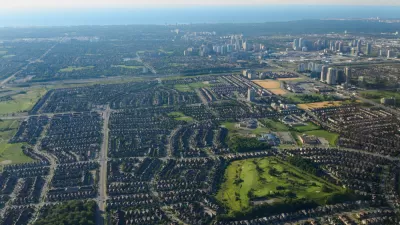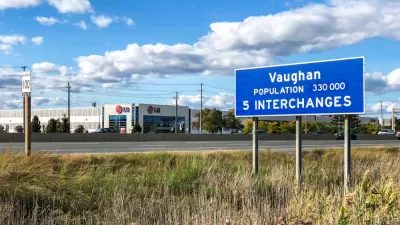A new report praises Ontario's greenbelt - 11 times the size of Toronto - as a model for urban growth control.
"The loss of prime agricultural land near cities due to urban sprawl is bemoaned the world over as a modern blight. But a solution may be at hand, for which Toronto should be recognized as a world leader: greenbelts, or farmland and environmentally sensitive land that has been officially made off limits to developers.
A study being released today says the zone of protected land around Toronto is not only one of the largest greenbelts in the world, but is also superior to ones in North America and Europe.
'Ontario's greenbelt is positioned to be the most successful and most useful greenbelt in the world,' concluded the study, compiled by the Canadian Institute for Environmental Law and Policy, a Toronto-based think tank. In making the assessment, the institute looked in detail at B.C.'s agricultural land reserve, one of the first efforts to curb sprawl in North America; Oregon's urban growth boundary; the unusual greenbelt that Germany is developing in the former no-man's land along the Iron Curtain; and the famed greenbelts around London and near Amsterdam. It dismissed as a "failure" the greenbelt around the Ottawa region assembled by the National Capital Commission, suggesting it has facilitated rather than hindered urban sprawl.
The study says farmers should be compensated 'financially for implementing environmental stewardship activities that benefit everyone.'
As well, governments need to encourage the consumption of food grown in the greenbelt through farmers markets and promoting crops that appeal to Canada's growing visible minority population.
The study will be submitted to the province as part of a consultation process by the ministry of municipal affairs on ways municipalities near Toronto can have some of their remaining rural countryside included in the greenbelt."
FULL STORY: Ontario's greenbelt a model for the world

Alabama: Trump Terminates Settlements for Black Communities Harmed By Raw Sewage
Trump deemed the landmark civil rights agreement “illegal DEI and environmental justice policy.”

Planetizen Federal Action Tracker
A weekly monitor of how Trump’s orders and actions are impacting planners and planning in America.

The 120 Year Old Tiny Home Villages That Sheltered San Francisco’s Earthquake Refugees
More than a century ago, San Francisco mobilized to house thousands of residents displaced by the 1906 earthquake. Could their strategy offer a model for the present?

In Both Crashes and Crime, Public Transportation is Far Safer than Driving
Contrary to popular assumptions, public transportation has far lower crash and crime rates than automobile travel. For safer communities, improve and encourage transit travel.

Report: Zoning Reforms Should Complement Nashville’s Ambitious Transit Plan
Without reform, restrictive zoning codes will limit the impact of the city’s planned transit expansion and could exclude some of the residents who depend on transit the most.

Judge Orders Release of Frozen IRA, IIJA Funding
The decision is a victory for environmental groups who charged that freezing funds for critical infrastructure and disaster response programs caused “real and irreparable harm” to communities.
Urban Design for Planners 1: Software Tools
This six-course series explores essential urban design concepts using open source software and equips planners with the tools they need to participate fully in the urban design process.
Planning for Universal Design
Learn the tools for implementing Universal Design in planning regulations.
Clanton & Associates, Inc.
Jessamine County Fiscal Court
Institute for Housing and Urban Development Studies (IHS)
City of Grandview
Harvard GSD Executive Education
Toledo-Lucas County Plan Commissions
Salt Lake City
NYU Wagner Graduate School of Public Service





























